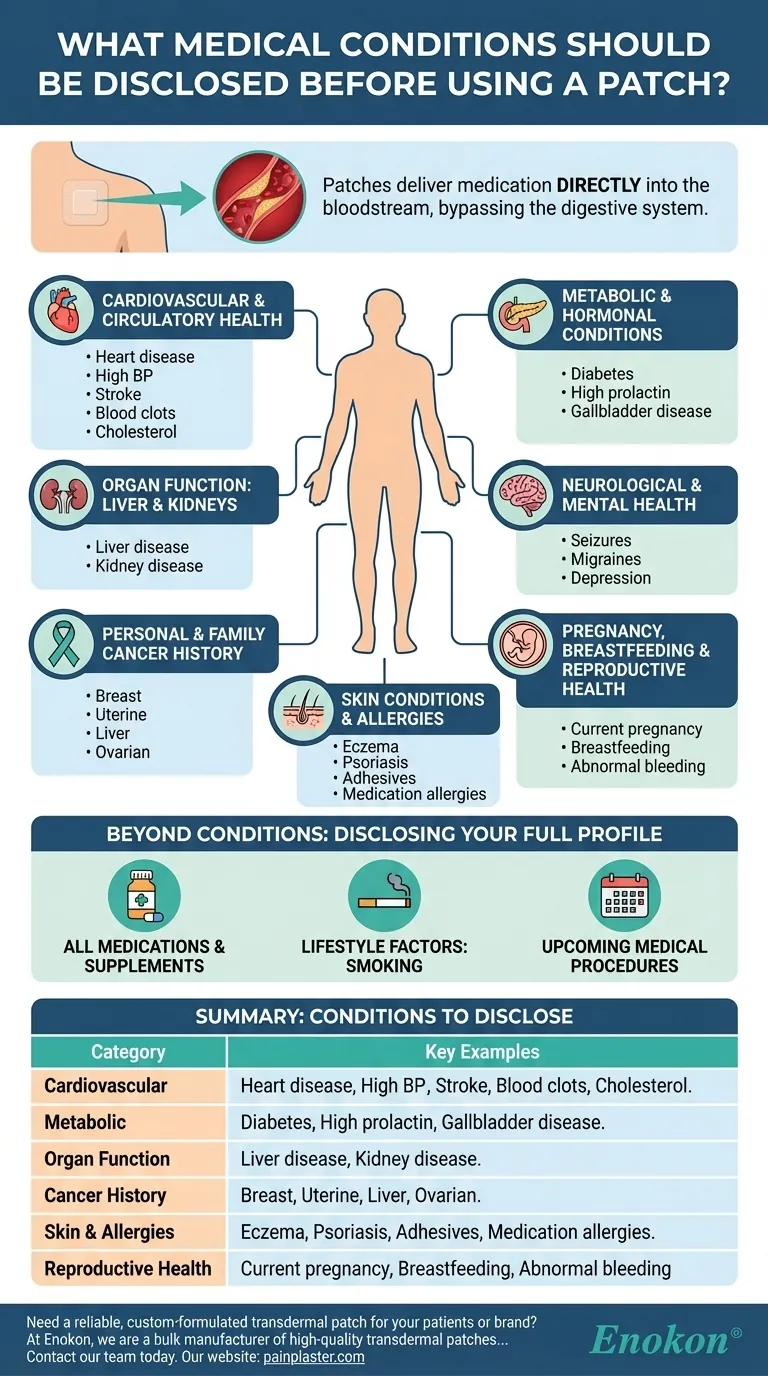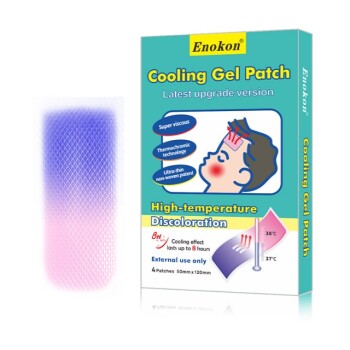Before using any medical patch, it is crucial to disclose a comprehensive range of health conditions to your healthcare provider. This includes any history of heart, blood vessel, or circulatory problems; metabolic disorders like diabetes; issues with your liver or kidneys; and any personal or family history of certain cancers. Full transparency about your health is the most important step in ensuring the treatment is both safe and effective for you.
The core principle to understand is that medical patches deliver medication directly into your bloodstream. This bypasses the digestive system, making your complete medical history—especially cardiovascular, metabolic, and organ health—essential for preventing serious complications.

Why Your Full Medical History is Critical
A medical patch, whether for contraception, pain relief, or hormone replacement, is a systemic treatment. The medication it contains is absorbed through your skin and circulates throughout your entire body.
This method of delivery means the medication can directly affect your cardiovascular system, interact with other drugs you're taking, and be processed by your liver and kidneys. An incomplete medical history can lead to a provider unknowingly prescribing a treatment that poses a significant risk to your health.
Key Conditions to Disclose: A Systematic Breakdown
To ensure your safety, provide a detailed history across several key areas of your health.
Cardiovascular and Circulatory Health
This is often the most critical area of concern. Inform your provider if you have or have ever had:
- Heart disease, a recent heart attack, or irregular heartbeat
- High or low blood pressure
- History of stroke or blood clots
- High cholesterol or triglycerides
- Blood vessel disease or heart valve problems
Many patch-delivered medications can influence blood pressure, heart rhythm, and the body's natural clotting mechanisms.
Metabolic and Hormonal Conditions
Your metabolic system is sensitive to many medications. Be sure to mention:
- Diabetes or high blood sugar (including a family history)
- High prolactin levels
- Gallbladder disease
Hormonal patches, in particular, can impact blood sugar regulation and other metabolic functions.
Organ Function: Liver and Kidneys
Your liver and kidneys are your body's primary filters for processing and clearing medications. Disclose any history of:
- Liver disease or other liver problems
- Kidney disease
Impaired function of these organs can cause medication to build up to unsafe levels in your body.
Neurological and Mental Health
Conditions affecting the brain and nervous system can interact with patch medications. Always report:
- Seizures or epilepsy
- Migraine headaches, especially if they are severe
- A diagnosis of or symptoms of depression
Personal and Family Cancer History
For hormonal patches, this information is vital. Tell your provider about:
- Any personal history of breast, cervical, endometrial, ovarian, liver, or uterine cancer
- Any unexplained breast lumps or changes
Skin Conditions and Allergies
Since the patch is applied to the skin, local reactions are a primary concern. Disclose:
- Known skin conditions like eczema or psoriasis
- Any history of skin sensitivity or infections
- Allergies to adhesives or specific medications like lidocaine, menthol, salicylates, or parabens
Pregnancy, Breastfeeding, and Reproductive Health
Your reproductive status is a key factor in determining if a patch is appropriate. Inform your provider about:
- Current or planned pregnancy
- Whether you are breastfeeding
- Any abnormal vaginal bleeding
- A recent childbirth, miscarriage, or abortion
Beyond Conditions: Disclosing Your Full Health Profile
Effective risk assessment goes beyond diagnosed conditions. Your provider needs a complete picture of your health and lifestyle.
All Current Medications and Supplements
Provide a complete list of everything you take, including prescriptions, over-the-counter drugs, vitamins, and herbal supplements. This is the only way to screen for potentially dangerous drug interactions.
Lifestyle Factors like Smoking
Tobacco smoking dramatically increases the risk of serious side effects, such as blood clots, particularly with hormonal contraceptive patches. This is a non-negotiable disclosure.
Upcoming Medical Procedures
If you have any scheduled surgeries or laboratory tests, inform your provider. Some medications delivered by a patch may need to be stopped before a procedure.
Making the Right Choice for Your Goal
Use this checklist to prepare for a productive and safe conversation with your healthcare provider.
- If your primary focus is cardiovascular safety: Emphasize any personal or family history of heart disease, stroke, blood clots, or high blood pressure, as these are often the most serious contraindications.
- If you are considering a hormonal patch: Your smoking status, history of migraines, and full reproductive health history are critically important topics to discuss in detail.
- If you have sensitive skin or known allergies: Ask about the patch's specific ingredients and adhesives to prevent a painful or dangerous localized reaction.
- If you take any other medications (even over-the-counter): Bring a complete list to your appointment to allow your provider to screen for potential drug interactions.
A transparent conversation with your healthcare provider is the foundation of safe and effective treatment.
Summary Table:
| Category of Condition | Key Examples to Disclose |
|---|---|
| Cardiovascular & Circulatory | Heart disease, high blood pressure, history of stroke or blood clots |
| Metabolic & Hormonal | Diabetes, high prolactin levels, gallbladder disease |
| Organ Function | Liver disease, kidney disease |
| Cancer History | Personal/family history of breast, uterine, or liver cancer |
| Skin & Allergies | Skin conditions (eczema), allergies to adhesives or medications |
| Reproductive Health | Pregnancy, breastfeeding, abnormal vaginal bleeding |
Need a reliable, custom-formulated transdermal patch for your patients or brand?
At Enokon, we are a bulk manufacturer of high-quality transdermal patches and pain plasters. We partner with healthcare distributors and pharmaceutical brands to develop safe, effective solutions tailored to specific therapeutic needs.
Leverage our technical expertise for custom R&D and product development. Contact our team today to discuss your project requirements.
Visual Guide

Related Products
- Herbal Eye Protection Patch Eye Patch
- Natural Herbal Wormwood Patch Pain Plaster
- Prostate Pain Kidney Health Care Patch for Men
- Menthol Gel Pain Relief Patch
- Icy Hot Menthol Medicine Pain Relief Patch
People Also Ask
- What are the steps for properly using eye patches? Maximize Benefits for Your Delicate Eye Area
- How do eye patches enhance the effectiveness of eye creams? Boost Your Eye Care Routine
- What are the main benefits of using eye patches in a skincare routine? Revitalize Your Under-Eye Area
- Can under eye patches smooth fine lines and wrinkles? Hydrate & Plump for Youthful Skin
- What are the steps for applying under-eye patches? Boost Your Eye Care Routine
















